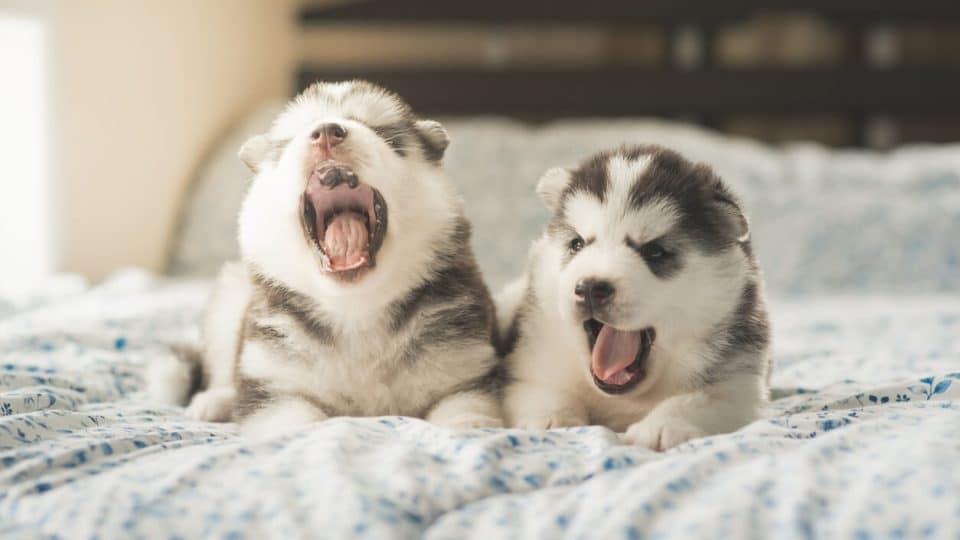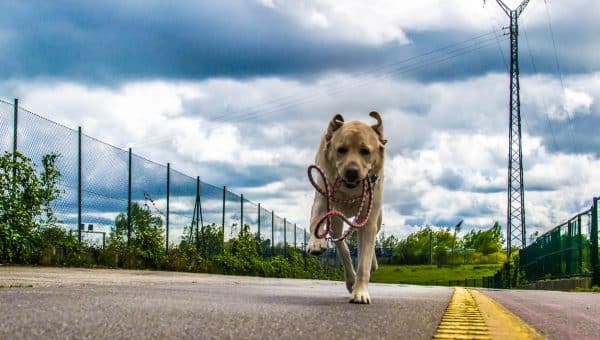- This post contains affiliate links. Read more here.
- Not a substitute for professional veterinary help.
When we yawn, the meaning often feels obvious. We’re either tired, bored, or just witnessing another person yawning. Do dogs have the same type of empathy, though? For our four-legged friends, yawning can mean a few different things. And unlike our yawns, not all dog yawns are created equal. The three most common reasons for a dog yawning are regulation of stress levels, out of trust or mimicking our behavior, or tiredness and boredom—just like us pet parents. To figure out the exact reason, you’ll need to decipher their behavior and look at context clues.
“There are a few positive reasons your dog may yawn,” says Dr. Shannon Barrett, Charleston-based house-call veterinarian and owner of Downward Paws. “One reason may be that they are content and relaxed, similar to how we often yawn when feeling calm and at ease.”
But, yawning can also indicate feelings of unhappiness, fear, or boredom. “It is essential to differentiate between a normal and abnormal yawn,” says Dr. Barrett, adding that abnormal yawns can indicate stress and anxiety.
With the help of Dr. Barrett, the theories behind dog yawning and what to do if your dog is yawning out of stress.
Your dog is stressed or scared
“Stress yawns are usually accompanied by clues such as cowering, panting, pacing, or hiding,” says Dr. Barrett. “Additionally, if your dog has been in an unfamiliar setting recently, such as the vet, they may feel anxious and start exhibiting signs like excessive yawning.”
Here are some additional stress signs to watch out for, according to Dr. Barrett:
- Ears pinned back
- Exaggerated yawn with a wide mouth and extended tongue
- Pacing back and forth
- Trembling
- Drooling
- Panting heavily
- Following you around more closely than usual
- Changes in posture (i.e. tucked tail)
- Avoidance behaviors (i.e. turning away from you or their toys)
- Rapid eye blinking or lip licking.
- Excessive yawning without breaks between each one
“This could also signal high anxiety or stress levels,” says Dr. Barrett. She notes that yawning can be observed in dogs as a way to destress.
“Anything that causes your dog to feel threatened or uncomfortable can trigger these yawns,” says Dr. Barrett. It’s important to observe whether your dog is exhibiting this behavior in response to physical stimuli, such as a loud noise, or for an emotional reason. Determining the cause of your dog’s stress can help you properly address their needs.

LukaTDB/iStock
Your dog is feeling joy, love, or empathy
As Dr. Barrett, and this 2008 study, mention, it’s possible that the yawns dogs “mirror” back to humans (a.k.a. “contagious” yawns). If your dog yawns along side with you, this may be a potential sign or communication of trust, bonding, or empathy.
Dr. Barrett says it’s typically a good sign to have a dog yawn while resting, playing, cuddling you, or being petted. “A happy and relaxed yawn will generally be slow, with the mouth opening wide while the jaw drops slightly,” she says. “This type of yawn usually has no accompanying sounds like growls or whines. Their eyes may also close briefly—but should not remain closed for an extended period.”
Happy yawning isn’t all about relaxation, though, it can be present for other types of happiness. “Yawning can also indicate excitement or anticipation for something enjoyable, such as going for a walk or playing fetch,” says Dr. Barrett.
Here are some tell-tale signs of a happy dog that may accompany their yawn:
- Lying down with all four paws tucked underneath
- Rolling onto their backs with their belly exposed
- Ears in a relaxed, natural position
- Tail wagging
- Play bow
Though we can’t prove that the above are signs that our dogs love us—we’re pretty sure that a resting doggy, yawning and relaxing in our laps, surely doesn’t hate us!
Your dog is bored or frustrated
Have you ever seen your dog yawn during a training session? This could mean they’re bored—or frustrated. To differentiate between boredom and frustration, you’ll have to look at your dog’s reactions. If your dog isn’t getting the cues right away—or stopping training on their own—yawning can be a sign that they need a little more paw-holding. In this case, decrease the level of difficulty or make the trick easier to complete, and your dog should turn around.
But if they are completing the tricks with ease and opting to be a bit of a terror? That might mean they’re bored.
“If your dog is bored, it can manifest itself in several ways,” says Dr. Barrett. Look for the following behaviors:
- Excessive barking and whining
- Digging
- Chewing on furniture or shoes
- Pacing back and forth
The above could be signs your dog needs more stimulation, according to Dr. Barrett. Stimulation can look like longer walks, more dog social time, or new toys.
Your dog is tired or overtired
“Fatigue or tiredness means they are not getting enough sleep, or the quality of their sleep is reduced,” says Dr. Barrett. In addition to yawning, other physical signs of exhaustion include:
- Heavy panting
- Drooping ears and eyes
- Decreased energy levels
- Lack of interest in playtime
“Does your dog have a quiet place to sleep? Are they itchy and licking their paws all night? Are they in discomfort and constantly readjusting in their bed due to arthritis? Perhaps they have a UTI and are in and out of the doggie door all night,” suggests Dr. Barrett on issues that could be affecting your dog getting their proper Zzz’s. “If dogs cannot sleep, there is likely a medical reason.”
Your dog is regulating themselves
If you see your dog yawning while another dog is trying to engage with them, that’s a good sign to step in and help your dog. Research shows that yawning is seen after periods of conflict and stress. This is normally different from when we yawn, as we use it to indicate we’re not afraid or phrased. For dogs, however, this can be a sign of passivity. If your dog yawns in response to an altercation with a larger or more aggressive dog, it could just be their way of saying “let’s just chill.”
Should I See A Vet If My Dog Is Yawning?
As with most things, treatment of yawning that relates to a medical issue will depend on the underlying cause. Yawning with lack of sleep due to skin allergies requires a much different approach than yawning due to a lack of adequate stimuli. “Sometimes a yawn is just a yawn,” says Dr. Barrett.
To distinguish between a normal yawn and a concerning yawn; Dr. Barett notes the following uncharacteristic behaviors should be a sign to see your vet:
- paw licking
- barking excessively
- lethargy
- loss of appetite
- yawning while eating or drinking
- excessive yawns
You also want to differentiate yawning from behaviors like “fly biting” (a.k.a biting the air as if trying to catch a fly). “[Fly biting] can signal GI or neurological issues, so I always recommend taking a video of your dog for your vet,” Dr. Barrett advises. “Sometimes our dogs don’t want to perform the ‘yawn’ in the hospital.”
If your vet has ruled out a medical reason, and you notice your dog is yawning in specific situations or around certain triggers, you’ll want to talk to a professional about how you can best manage your dog’s anxiety to help get them back on track.
How Much Do We Actually Know About Dog Yawns?
At the end of the day, your dog’s behaviors, including yawning, are highly contextual and a common, involuntary behavior. Though there are several theories, it’s important to note that though several observational studies have been conducted, science has not yet confirmed a definitive reason for why dogs yawn.
“One of the oldest theories behind why dogs yawn is contagious yawning,” says Dr. Barrett. She references a 2012 animal cognition study that sought to discover if dogs could ‘catch’ yawns just by hearing the yawns of humans. Not only did the dogs yawn upon hearing the yawn of a human, but they yawned more upon hearing the yawn of someone familiar to them. “However, strict scientific researchers are unsure how to ‘measure’ empathy and, therefore, hesitant to agree with this theory.”
The other theory is that yawning helps your dog “shake it off”.
“Some believe that the act triggerlva, Ks calming hormones, which can help reduce anxiety levels in people and pets,” Dr. Barrett says. When dogs yawn while meeting new people, or while being in loud, unfamiliar environments, this can be a stress response. “Stretching their mouth wide open, while taking deep breaths, helps them calm down and relax.”
Often, yawning is perfectly normal behavior—even if the reasons are still a bit of a mystery. “There is still much to be learned about this topic,” says Dr. Barrett, “and how animals may communicate with us and each other.”
If you’re curious or concerned about your dog’s yawning, be sure to observe what additional behaviors they’re exhibiting. Should you suspect a medical or psychological reason for their yawning, be sure to take a video of your dog’s yawn and share with your vet.





